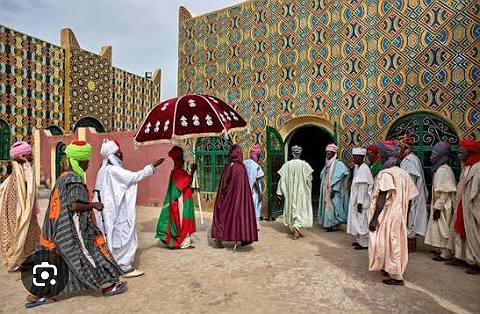"HISTORY OF HAUSA CULTURE"
Hausa culture developed from the Bayajida myth, which led to the formation of powerful Hausa city-states by the 11th century. These states, organized around trade and Islamic governance, evolved into a wealthy, urban civilization. The early 19th century saw the Hausa-Fulani Sokoto Caliphate, which established a consolidated Hausa-Fulani identity and strengthened Islamic influence within the region. Today, Hausa culture is known for its rich traditions in trade, craftsmanship, language, and the prominent role of Islam, alongside a unique equestrian culture.
Early Origins & Formation of City-States
Mythical Origins: The Hausa people's foundational myth tells of the Bayajida legend, a prince from Baghdad who married the queen of Daura, establishing the Hausa Bakwai (the seven most senior Hausa states).
Urban & Commercial Centers: By the 11th century, these city-states—including Kano, Katsina, and Zaria—became centers of advanced urban and commercial civilization in the Sahel region.
Cultural and Religious Development
Islam's Influence: The 14th century marked a significant shift with the adoption of Islam, which deeply influenced Hausa art, laws, and social structures, leading to the construction of impressive Islamic architecture.
Trading Culture: The Hausa have a long tradition as traders, controlling trans-Saharan trade routes and fostering economic prosperity. This wealth supported the development of their distinctive culture.
The Hausa-Fulani Sokoto Caliphate
Usman Dan Fodio's Jihad: In the early 19th century, a jihad led by Usman Dan Fodio led to the conquest of the Hausa states and the formation of the Sokoto Caliphate.
Fusion of Cultures: This period fostered a stronger unity between Hausa and Fulani peoples, with the Fulani adopting Hausa language and customs, and a unified Hausa-Fulani cultural identity emerging.
Modern Hausa Culture
Diverse Livelihoods: Hausa communities are predominantly farmers, pastoralists, and traders, with Kano remaining a major economic and cultural hub.
Equestrian Culture: The well-established tradition of horse-riding continues, featuring prominently in celebrations with decorated horses, reflecting a historical importance to the Hausa way of life.
Social Values: Hausa society is characterized by strong patriarchal family structures, a deep respect for elders and authority, and a collective social ethos where cooperation and empathy are highly valued.
Hausa culture developed from the Bayajida myth, which led to the formation of powerful Hausa city-states by the 11th century. These states, organized around trade and Islamic governance, evolved into a wealthy, urban civilization. The early 19th century saw the Hausa-Fulani Sokoto Caliphate, which established a consolidated Hausa-Fulani identity and strengthened Islamic influence within the region. Today, Hausa culture is known for its rich traditions in trade, craftsmanship, language, and the prominent role of Islam, alongside a unique equestrian culture.
Early Origins & Formation of City-States
Mythical Origins: The Hausa people's foundational myth tells of the Bayajida legend, a prince from Baghdad who married the queen of Daura, establishing the Hausa Bakwai (the seven most senior Hausa states).
Urban & Commercial Centers: By the 11th century, these city-states—including Kano, Katsina, and Zaria—became centers of advanced urban and commercial civilization in the Sahel region.
Cultural and Religious Development
Islam's Influence: The 14th century marked a significant shift with the adoption of Islam, which deeply influenced Hausa art, laws, and social structures, leading to the construction of impressive Islamic architecture.
Trading Culture: The Hausa have a long tradition as traders, controlling trans-Saharan trade routes and fostering economic prosperity. This wealth supported the development of their distinctive culture.
The Hausa-Fulani Sokoto Caliphate
Usman Dan Fodio's Jihad: In the early 19th century, a jihad led by Usman Dan Fodio led to the conquest of the Hausa states and the formation of the Sokoto Caliphate.
Fusion of Cultures: This period fostered a stronger unity between Hausa and Fulani peoples, with the Fulani adopting Hausa language and customs, and a unified Hausa-Fulani cultural identity emerging.
Modern Hausa Culture
Diverse Livelihoods: Hausa communities are predominantly farmers, pastoralists, and traders, with Kano remaining a major economic and cultural hub.
Equestrian Culture: The well-established tradition of horse-riding continues, featuring prominently in celebrations with decorated horses, reflecting a historical importance to the Hausa way of life.
Social Values: Hausa society is characterized by strong patriarchal family structures, a deep respect for elders and authority, and a collective social ethos where cooperation and empathy are highly valued.
Topic Live
























